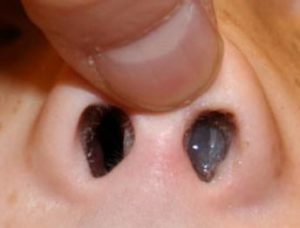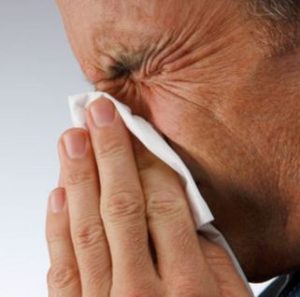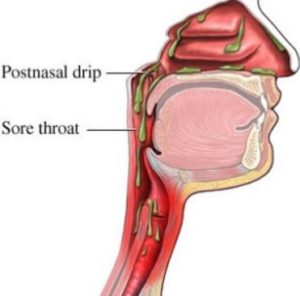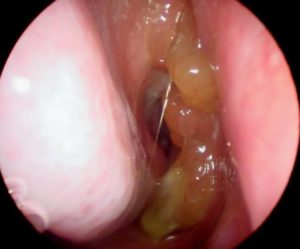Smelly mucus in nose and throat can be a clear sign of sinus infection. The infection of the sinus is also known as sinusitis. Chronic sinusitis will be shown by thick drainage that is foul in smell and taste. Here are some of the other possible causes, treatment and how to get rid of smelly mucus in the nose.
Smelly mucus in nose and throat
What could be causing smell mucus in nose and throat? The blockage or inflammation of the inside nose is a common cause for smell mucus. This kind of inflammation is caused by non-allergic rhinitis which is the inflammation of the inside of nose that isn’t caused by an allergy. Non-allergic rhinitis can be shown by symptoms such as:
- Nasal blockage
- Sneezing
- Some people will experience a runny nose
- Irritation and discomfort in and around the nose
- Reduce sense of smell
- Though rare, some people may develop a crust inside the nose that bleeds and produces a foul-smelling odor.
If you notice the above symptoms persist for more than a day, you will need to have your health care provider diagnose it to establish what the underlying cause of the condition is for easy treatment and medication. Treatment not only involves getting rid of the underlying cause but also controlling and managing the symptoms.
If for instance, non-allergic rhinitis is diagnosed as the underlying cause of the smelly mucus, there are different causes that could have led to the blocking or inflammation of the nose, a common cause is a viral infection such as a cold. Other causes will include environmental factors such as extreme temperatures, humidity, and exposure to noxious fumes.
Non-allergic rhinitis can also be caused by internal factors such as hormone imbalances like those occurring in puberty and pregnancy. The same symptoms can be shown in those who undergo hormone replacement therapy or hormonal contraception.
The other possible cause of smelly mucus is post nasal drip. The thick mucus associated with post nasal drip provides an ideal medium for the anaerobic bacteria responsible for the offensive oral odor. Post-nasal drip will not only cause smell mucus but also bad breath is otherwise known as halitosis. Dentists words that brushing or flossing won’t eliminate bad breath caused by post-nasal drip.
Post nasal drip associated with a transient cold or allergic attack can be effectively treated with a variety of home remedy that focuses on loosening, thinning and drying up mucus secretion. A commonly used remedy for this is usually drinking lots of warm fluids such as soup and herbal teas.
Treating the sources of excess mucus production and eliminating the proliferation of anaerobic bacteria that thrives in this kind of medium is the best way to prevent and get rid of smell mucus or bad breath associated with post nasal drip.
What causes smelly mucus in the nose?
what causes smelly mucus in nose? Below here are a number of possible reasons of having a smelly nose.

What Causes Smelly Mucus In Nose – Video
1. Sinusitis
Sinusitis is a common cause of inflamed and blocked nasal passage that could be causing the smelly mucus. It is a common condition in which the lining of the sinuses becomes inflamed. The inflammation and swelling are usually caused by a viral infection and often improves within two or three weeks.

In the United States alone, the condition affects close to 30 million people each year, this is according to a statistic by the National Institute of Allergy and Infectious Diseases. A sinusitis or sinus infection will occur when your sinuses become inflamed.
Sinuses are small air pockets located behind your forehead, nose cheekbones and eyes. They protect the body by trapping germs. Bacteria or allergens may cause too much mucus to form, this may block the opening of your sinuses. This is the way most people will have a runny nose when they have a cold or allergy.
The buildup of mucus may encourage bacteria and germs to grow in your sinus cavity. This is what leads to viral or bacterial infection. Most of this infections are viral, they may clear in a week or two without treatment. The accumulation of the mucus in the nasal passage and throats may cause bad breath and smelly mucus.
To treat this kind of inflammations, a corticosteroid drop or spray may be used. Also known as steroids, corticosteroids are a group of medication that can help reduce inflammation. If the swelling or inflammation persist, your health care provider may prescribe other treatment option to reduce the swelling in the sinuses.
Other symptoms such as congestion can be treated by applying a warm compress, pain can be relieved by using painkillers. Sometimes antibiotics will be used to treat mild bacterial infection accompanying the inflammation of the sinuses. For sinuses infection, watch out for the following sign and symptoms:
- Drainage of a thick or greenish discharge from the nose
- Nasal congestion that causes difficulties to breath
- Pain, swelling, tenderness and pressure around eyes cheek, nose, and forehead
- Severe headache
- Ear pressure
- Fever and fatigue
2. Tonsillitis-tonsil stones
Another possible cause of smelly mucus is tonsillitis. Tonsillitis is the inflammation of the tonsils. Tonsils refer to the oval-shaped pads of tissues at the back of the throat. Common symptoms of tonsillitis will include swollen tonsils, sore throats, and difficulty swallowing and tender lymph nodes on the sides of the neck.
Tonsillitis is often caused by infection with a common virus, a bacterial infection may sometimes cause the swelling too. Proper treatment will depend on the underlying cause of the infection. To get a proper treatment therefore, you need to get a prompt and accurate diagnosis. Your doctor may prescribe surgery when bacterial tonsillitis occurs frequently, fails to respond to other treatment option r results into other serious complications.
Inflammation may involve other areas of the back of the throat. These areas include the adenoids and the lingual tonsils. There are various variations of tonsillitis, acute, recurrent and chronic tonsillitis. Of the three variations, pain in the throat and trouble swallowing.
3. Post-nasal drip
PND, also known as the upper airway cough syndrome, occurs when there is excess secretion of mucus by the nasal mucosa. The excess mucus accumulates in the throat or back of the nose. Mucus is responsible for moistening and also help trap and destroy foreign invaders like bacteria and virus before they can cause infection.

With normal secretion, it is not possible for you to notice the mucus. This is because it mixes with saliva and drops harmlessly down the back of your throat and you swallow it without even noticing. When your body produces more mucus, the mucus becomes thicker than normal, this will make it more noticeable.
The accumulated mucus also provides a good environment where bacteria can thrive and reproduce, a bacterial infection is more likely to cause smelly mucus. When the excess mucus comes out of the nostrils, it becomes a running nose, when it runs down the back of your nose to your throat, it is called a postnasal drip.
Post-nasal drip can be caused by colds, flu, allergies, sinuses infection, pregnancy or changing the weather. Depending on the diagnosis, possible treatment would include:
- Antibiotic to treat bacterial infection
- Surgery in cases of chronic sinus disease
- Oral medication and spray for allergies
- Antacid when the post nasal drip causes gastric reflux disease.
4. Nasal polyps
Nasal polyps are soft painless, noncancerous growths on the lining of your nasal passage. They result from chronic inflammation of due to asthma, recurring infection, allergies, and sensitivity to the drug or immune disorders.
Small nasal polyps are asymptomatic, large growths or group of polyps can, however, can lead to breathing problems due to blocking nasal passage, some people will also experience lost the sense of smell and frequent infections. Though common in adults, nasal polyps can affect anyone.

Your doctor may prescribe medication to shrink or eliminate nasal polyps but surgery is sometimes needed to remove them. Nasal polyps may often return even after successive treatment. Unlike polyps that form in the colon or bladder, nasal polyps are rarely cancer. These polyps are also not painful to touch.
A chronic sinusitis with nasal polyps can be shown by:
- Runny nose
- Annoying snoring
- Reduced sense of smell
- Severe headache and facial pain
- Pain in upper teeth
- Post nasal drip
5. Rhinitis
Rhinitis is the inflammation of the mucous membrane of the nose. Just like the other possible causes of smelly mucus, rhinitis is also caused by a virus infection. The inflammation can also be caused by the common cold or by an allergic reaction such as hay fever.
In rhinitis, the mucous membrane becomes infected or irritated, it produces a discharge, congestion, and swelling of the tissues. A common cold is the most widespread form of infectious rhinitis. Depending on the causes, rhinitis can either be allergic or non-allergic. The difference is that allergic rhinitis is caused by allergies whereas non-allergic rhinitis is caused by other causes such as common cold.
Allergic rhinitis causes cold-like symptoms such as sneezing, itchiness, blocked or runny nose. These symptoms will start soon after being exposed to the allergen. Treating rhinitis will depend on the underlying cause of the inflammation. With allergic rhinitis, it is difficult to avoid potential allergens, different steps can, however, be taken to reduce exposure to the said allergen that could trigger the inflammation.
6. Snoring
When you are asleep, the mouth produces less saliva. Snoring worsen this situation by causing excessive dryness of your tongue, throat, and palate. This creates an enabling environment for bacteria to reproduce. The accumulation of sulfur compounds is what causes the bad breath and a foul odor when you wake up in the morning.
Snoring can be treated or managed at home in the following way:
- By sleeping sideways and using a full-length pillow to try and hold your position while asleep
- Keeping humidity level down by using a humidifier
- Avoiding alcohol, or depressants before bed.
- Regular excesses to keep and remain fit
7. Poor oral health-tooth decay
Poor oral health could also lead to bacterial accumulation through condition such as tooth decay or other oral disorders.
Smelly nasal discharge in adults
Anybody regardless of age can have smelly mucus at some point. In adults, the common cause is rhinitis which is the inflammation of the nasal passage. This condition is known to cause a runny, smelly discharge from the nose.
Rhinitis can be temporary when caused by an allergic reaction or chronic, where the symptoms last for more than six weeks. For mild cases of nasal blockage, the condition might resolve on its own, for chronic or severe cases, however, you will need to have professional health care provider diagnose the condition and prescribe the treatment to get rid of the blockage.
In an adult, the other cause of the smelly mucus could be sinusitis, this is the inflammation of the sinuses. Sinuses are air-filled cavities situated behind the forehead, eyes, cheekbone and bridge of the nose. They filter the air we breathe in, using mucus to trap dirt, bacteria and other potentially harmful particles.
The sinuses will become inflamed or swollen during infection or allergic reactions. When this happens, they are unable to drain the mucus from the head out of the body. The accumulation of mucus creates an enabling environment for bacterial growth and breeding. This is what leads to unpleasant smelling bacterial infection.
Infection of the sinuses will be shown by the following symptoms.
- Obstruction and congestion of the nasal passage
- Bad breath
- Sore throats
- Thick yellow or green mucus appearing in the nose or throat
- Coughing especially at night
- Diminished sense of taste and smell
Mild cases of Smelly mucus in adults can resolve on its own. For severe cases caused by allergic rhinitis, sinusitis or post-nasal drip, immediate medical attention is advised. Those with allergies or a weak immune system stand the highest chance developing a sinus infection.
Treatment for smelly Mucus in Nose
Treatment for smelly mucus not only involves controlling and managing the symptoms but also getting rid of the underlying cause of the condition. For allergic rhinitis or the inflammation of the sinuses, it is important to have a professional health care provider diagnose the problem and prescribed the required medication. This way you are able to minimize the risk of complications.
After carrying out a medical examination, the treatment will depend on what the underlying cause of the condition is or how severe the symptoms are. Below are some of the possible treatment option your doctor may prescribe for the treatment of smelly mucus.
Oral antibiotics
For sinusitis caused by virus infection, no antibiotic treatment is required. For bacterial infection of the sinusitis, an oral antibiotic may be used. Bacterial infection of the sinusitis is suspected when facial pain, nasal discharge resembling pus and other symptoms persist for more than a week. The infection can also be suspected when the condition fails to respond to other the counter nasal medication.
The acute bacterial infection will be treated by antibiotic therapy. Antibiotics will work by killing or preventing the growth of the bacteria that might cause some sinus infection. When antibiotics are used to treat chronic cases of sinusitis or other causes of smell mucus, you need to remember that:
- The number of days you take the antibiotics will depend on your general health
- The choice of antibiotic will depend on how your body responds to them
- You can use the medicine with other medicine such as decongestants
Decongestant
A decongestant can help reduce the accumulation and blockage caused by mucus. The nasal spray will offer relief in this case. There is a variety of nasal spray available in the market. You can also simply prepare one useful by using saline solution.
Most decongestant containing benzalkonium are found to have a rebound effect. As such, the decongestant may prove effective initially, however, when the symptoms return within a day or two they will be worse than they were original.
Nasal steroid spray
Nasal steroid sprays are other commonly used medicine that is used to treat symptoms of stuffiness or decongestion in the nose. The medicine can also be used for allergies of the nose such as hay fever. Steroid sprays are also good for relieving the inflammation of the nose caused by other condition such as rhinitis.
A nasal corticosteroid spray reduces swelling and mucus in the nasal passageway. The spray can also work to treat symptoms such as congestion, runny nose, sneezing, itching or swelling of the nasal passageway.
Painkiller
WebMD recommends pain relievers to help with the fever and headaches that may accompany the swollen or inflamed nasal passage. Different brands of pain relievers can be accessed from drug stores near you.
Surgery for chronic sinusitis
Sometimes, a surgery may be done due to the complication of the sinusitis. This complication can include the development of pus in the sinus, infection of the facial one, or when abscess occurs inside the nose. The goal of the surgery is to make drainage of eh sinuses better, usually, by removing the blockage and draining of the mucus, this will mean:
- Removing infected, swollen or damaged tissue
- Removing the swollen bone to create a wider opening for the drainage of mucus from the sinuses.
- Getting rid of the growths inside the nose
- Removing a foreign object blocking the nasal passage
Surgery does not always completely eliminate sinusitis, some people will need a second operation. When treating a swollen of infected nasal passage, surgery becomes more effective when used alongside other medicine [WebMD]
How to get rid of smelly mucus in Nose
A mild case of blockage can be managed and controlled at home. Depending on what is causing the smelly mucus, the following remedies may offer relief for some of the symptoms accompanying the inflammation and swelling of the nasal passage before you have the condition diagnosed.
Peppermint oil, Peppermint is suitable for an abundance of oral and topical uses and antimicrobial properties. Along with lavender oil, peppermint may be among the most versatile essential oil in the world.
Drinking warm liquids might also help to keep your body temperature in check and relieve some common symptoms of a cold such as sneezing and runny nose.
You might also try to gargle with salt, salt contains strong antibiotic, anti-inflammatory and antiseptic properties that help reduce or fight bacterial infections in your mouth that could be causing the smelly mucus.
Though it does not really help you stop the production of mucus, Ginger can help get rid of mucus that remains after you have removed from the illness that was causing the smelly mucus. This is an ancient remedy which has been used in many cold and cough medicines.
Another strong home remedy you should possibly try is raw honey. Honey is antibacterial, anti-inflammatory and antifungal home remedy. It also contains antioxidants and flavonoids, not only does honey reduce mucus secretion, but also soothes the respiratory tract of the irritation.
Reference.
- What causes smell mucus: http://www.sorethroatremediesguide.com/bad-smell-in-nose-causes-and-treatment
- Causes of smell mucous: http://www.md-health.com/Smelly-Mucus-in-Nose.html
- Treatment for smelly mucus: http://www.livestrong.com/article/319697-smelly-mucus-in-the-nose/
- Home remedy for mucus in throat and nose: http://vkool.com/home-remedies-for-mucus/
